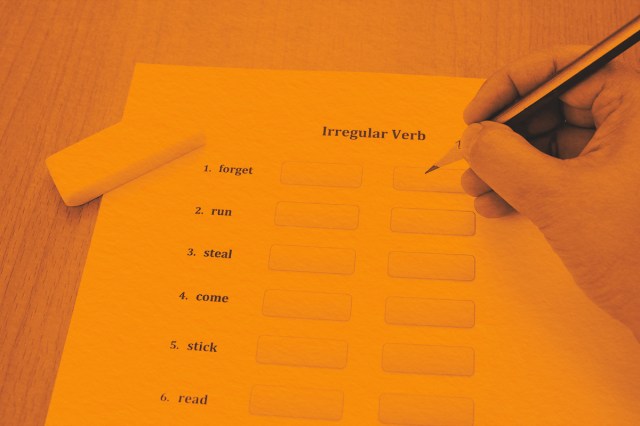
Have you ever stumbled across a word and thought, “Surely this must be a typo — or maybe an odd Shakespearean flourish”? Take this line in George Orwell’s Animal Farm: “When they thought of all this, their tiredness forsook them and they gambolled round and round the windmill, uttering cries of triumph.” Here, the verb “gambolled” (“to run or jump playfully”) is somewhat unusual but still follows the regular past tense “-ed” pattern. The real head-scratcher is the irregular verb “forsook,” the past tense of “forsake” (meaning “abandon or renounce”). Irregular verbs aren’t just spelled differently — they’re representative of an interesting linguistic journey.
Most English verbs are regular. You can more or less slap an “-ed” on the end of these verbs, and they become past tense. “Danced,” “jumped,” “laughed,” and “loved” follow this predictable conjugation pattern. But irregular verbs, such as “forsake,” don’t adhere to specific rules about past tense conjugation. Instead, they change in quirky and often unpredictable ways, including the seemingly random “forsook,” making mastery tricky.
Here’s the catch: Irregular verbs are extremely important to know. Although they account for only about 3% of the language, the 10 most-used English verbs are irregular. Consider the top five: “be,” “have,” “do,” “go,” and “say.” Their past tense forms don’t follow any regular pattern: “was,” “had,” “did,” “went,” and “said.” While these verbs have solidified their importance in our language, lesser-used irregular verbs run the risk of going extinct, according to some linguists.
Irregular verbs are remnants of older conjugation rules that died out over centuries. A group of Harvard linguists have a “frequency theory” — if an irregular verb is used infrequently, it will eventually be overtaken by an “-ed” version, keeping in line with the natural evolution of the language. This shift has already happened to some verbs, including “creep.” While the past tense “crept” was the norm for centuries, “creeped” has been gaining ground in popularity since the 1970s. In fact, of the 177 irregular verbs that existed around 1,200 years ago, 145 made it to Middle English, and 98 survived into modern-day English. The Harvard linguists have their eyes on “wed,” which they predict could become “wedded,” as in, “They wedded in December.”
Will more irregular verbs eventually align with the “-ed” rule? It’s hard to say. Some might argue that simplifying past tense verbs would make English easier to learn. But this simplification comes with the cost of losing the charm of irregular verbs. Personally, I’m not ready to forsake irregular verbs just yet.

















